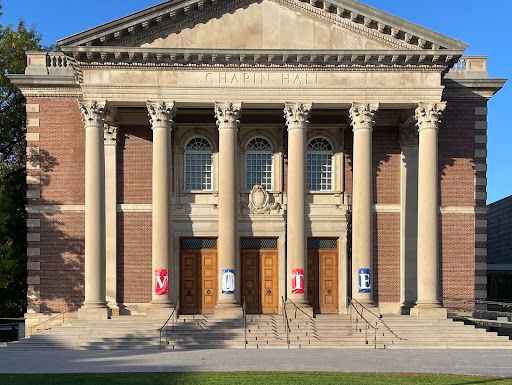Student organizations mobilize ahead of midterm elections
October 26, 2022

As the Nov. 8 Election Day approaches, Jesse Schumann ’25 has noticed an increased number of students visiting the EphVotes table during lunches at Paresky Center. “Every day the deadlines get closer, and I think there’s more urgency,” he said of student sentiment regarding upcoming elections.
Schumann is the president of EphVotes, the voter-outreach organization at the College and one of many ways students have mobilized around the upcoming midterm elections.
Unlike the majority of student groups organizing around electoral politics, however, EphVotes is nonpartisan and solely focused on increasing access to voting. “EphVotes was founded because the Williams College population had a pretty absurdly low [voter] registration and turnout rate,” Schumann explained. “The reason EphVotes exists is to make it as easy as possible for people to vote.”
Given that the midterm elections are mere weeks away, EphVotes has sprung into action, helping students register to vote and request absentee ballots, as well as supplying envelopes and stamps for students to mail ballots to their local election offices.
“There’s definitely a wide range of the interactions that I’m having with people,” Schumann said. “Sometimes it takes 10 to 15 minutes [to help] someone who has never voted before and doesn’t even know where to start.”
As a program under the Center for Learning in Action (CLiA), EphVotes has been able to work with the College’s administration to ensure their message about the importance of voting reaches the largest audience possible. On Oct. 17, President Maud S. Mandel wrote to students about the importance of voting in an all-campus email, encouraging them to “take advantage of this wonderful service” that EphVotes offers. Director of CLiA Paula Consolini, who serves as the staff advisor for EphVotes, also connected the organization with the College’s social media team for a takeover of the College’s official Instagram page. There, EphVotes board member Rachel Schmidt ’25 reiterated the importance of participating in the midterm elections.
Beyond EphVotes, students have also mobilized through partisan organizations, both at the College and in the local community.
College Democrats, a student political advocacy group, has focused its efforts on races in the New England region. “During election season, almost all of our stuff is contacting campaigns, getting people to canvass, getting people to do phone calls, hosting candidates — that sort of thing,” College Democrats co-President Carlos Hernandez Tavares ’25 said.
Hernandez Tavares has specifically focused campaigning efforts on New York’s 19th Congressional District, which borders much of Western Massachusetts. Hernandez Tavares said he saw the district as “probably one of the most competitive races in the entire New England area.”
In the week leading up to Election Day, College Democrats plans to host a “week of service,” with campaign events dedicated to a different candidate every day, including Pat Ryan, the Democratic nominee for the NY-19 district. This will include both door-to-door canvassing and phone- or text-banking opportunities to help elections beyond New England, Hernandez Tavares said.
College Democrats also recently hosted Paul Mark, the Democratic nominee for the local Massachusetts State Senate race, to speak to students. “It was really great, because he talked about the importance of advocacy, and then we had a sign up for our canvass,” Hernandez Tavares said. The event, he said, reinvigorated club members to get more involved with campaigning events they have planned.
Young Democratic Socialists of America (YDSA) doesn’t intend to support specific candidates in upcoming elections, said Emily Axelrod ’25, a board member of YDSA. “Our focus is not really on electoralism as much as it is on material action,” she said.
The organization, however, has worked alongside the Berkshires Democratic Socialists of America (DSA) to support organizing efforts in favor of Ballot Question 1, a proposed Massachusetts tax on annual income above $1 million directed to transportation and education, and Ballot Question 4, which would leave in effect a Massachusetts law that permits undocumented immigrants to obtain driver’s licenses despite their immigration status. YDSA is encouraging their members to attend canvasses in North Adams and Pittsfield organized by the Berkshires DSA for these ballot measures, Axelrod said.
Unlike College Democrats and YDSA, the Society for Conservative Thought (SCT), an intellectual organization for discussing conservative ideology, is less focused on efforts to mobilize voters. “We mainly exist just to be a place for conservative students or any students who are interested in conservative ideas to voice their opinions,” said Will Howe ’25, who is president of the club.
Ahead of Election Day, this has meant that SCT meetings have largely been dedicated to discussions about midterm election races. “Our topics, for example, will be what we think about the Arizona Senate race, what we think Republicans are doing wrong in Pennsylvania, [or] what we think of Trump-backed candidates,” Howe said.
Schumann noted how the conversations surrounding different types of elections play into voter turnout. “It feels like all everyone’s talking about is the presidential election,” he said. “I think it’s easier to vote in [presidential election] years because it’s just what’s on people’s minds.”
To Schumann, however, midterm elections are still incredibly important. “The stuff that you can really have a lot of say in and that really affects your everyday life are [local] elections.”








